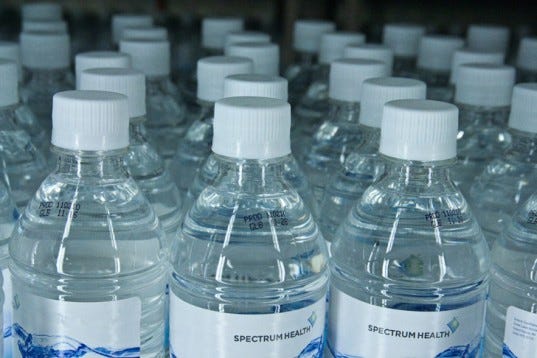The Town of Concord, MA has officially banned the sale of single-serving PET water bottles, becoming one of the first towns in the U.S. to pass such a law.The bylaw states, "It shall be unlawful to sell non-sparkling, unflavored drinking water in single-serving polyethylene terephthalate (PET) bottles of 1 liter (34 ounces) or less in the Town of Concord on or after Jan. 1, 2013."The first offense of this PET bottles bylaw results in a warning. The second is a $25 fine, and the third and each subsequent offense will be a $50 fine.
January 2, 2013
The Town of Concord, MA has officially banned the sale of single-serving PET water bottles, becoming one of the first towns in the U.S. to pass such a law.
The bylaw states, "It shall be unlawful to sell non-sparkling, unflavored drinking water in single-serving polyethylene terephthalate (PET) bottles of 1 liter (34 ounces) or less in the Town of Concord on or after Jan. 1, 2013."
The first offense of this PET bottles bylaw results in a warning. The second is a $25 fine, and the third and each subsequent offense will be a $50 fine.
 There is an exception for the declaration of an emergency that adversely affects the availability and quality of drinking water to Concord residents. Sales during that time will be exempt from this bylaw until seven days after the declaration has ended.
There is an exception for the declaration of an emergency that adversely affects the availability and quality of drinking water to Concord residents. Sales during that time will be exempt from this bylaw until seven days after the declaration has ended.
Ralph Vasami, executive director of the PET Resin Association (PETRA) told PlasticsToday PETRA believes the Concord ban is a sincere but misguided effort at trying to reduce plastic waste and littering.
"Encouraging Americans to recycle and re-use PET and other packaging materials is the key to reducing waste and extending the sustainable use of our resources and raw materials," he said. "PET is the most recycled plastic in the world. It can be recovered and recycled again and again, and is accepted by virtually every municipal recycling program in North America."
Bottled water was a necessity after Hurricane Sandy menaced parts of the East Coast last November. In the wake of Sandy, New York Mayor Bloomberg announced the city would send prepared meals and bottled water to residents having difficulty acquiring food and drink.
In addition, Nestlé Waters North America donated more than five million bottles of water to communities hard hit by Hurricane Sandy. Walmart donated roughly one million bottles of water, half went to the five boroughs of New York City and half to the state of New Jersey.
On April 25, 2012, Concord passed this ban on PET water bottles by a majority vote (403 voting in favor; 364 opposed). The state's attorney general approved the bylaw on Sept. 5, 2012.
Last year, marked the third straight year for this issue to come up for debate in Concord. A similar measure was passed in 2010, but the attorney general denied it because the bylaw wasn't written properly. In 2011, the town rejected the proposed bylaw.
Chris Hogan, VP of communications for the International Bottled Water Association, told PlasticsToday in April the association was "disappointed that a small group of individuals has made the decision to ban the sale of bottled water for a town of 17,000 residents."
"This ban will deprive residents, students, and tourists of their rights as consumers to make healthy choices when it comes to hydration and refreshment. It will also deprive the town of needed tax revenue and harm local businesses that rely on bottled water sales to help keep their doors open," he said.
However, he also added, "In terms of responding to the vote, at this point we are keeping all options on the table to support the rights of consumers to exercise their freedom of choice."
Americans drink nearly nine billion gallons of bottled water a year, according to the Beverage Marketing Corp. The continuous growth of plastic water bottle consumption in the U.S. has resulted in a $22 billion retail packaged-water industry.
WHDH-TV, an NBC-affiliated television station in Boston, reported in April passions were high on both sides of the debate.
"This reminds me of a communist country where dictators dictate to the masses what they're allowed to buy," one woman said.
"Clean, safe water is just a small sacrifice," another countered. "We're not gonna solve all the problems of the world but this is our one chance to make a really huge statement to the world."
About the Author(s)
You May Also Like


